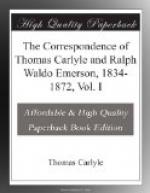Your satisfactions and reflections at sight of your English Book are such as I too am very thankful for. I understand them well. May worse guest never visit the Drawing-room at Concord than that bound Book. Tell the good Wife to rejoice in it: she has all the pleasure;—to her poor Husband it will be increase of pain withal: nay, let us call it increase of valiant labor and endeavor; no evil for a man, if he be fit for it! A man must learn to digest praise too, and not be poisoned with it: some of it is wholesome to the system under certain circumstances; the most of it a healthy system will learn by and by to throw into the slop-basin, harmlessly, without any trial to digest it. A thinker, I take it, in the long run finds that essentially he must ever be and continue alone;—alone: “silent, rest over him the stars, and under him the graves”! The clatter of the world, be it a friendly, be it a hostile world, shall not intermeddle with him much. The Book of Essays, however, does decidedly “speak to England,” in its way, in these months; and even makes what one may call a kind of appropriate “sensation” here. Reviews of it are many, in all notes of the gamut;—of small value mostly; as you might see by the two Newspaper specimens I sent you. (Did you get those two Newspapers?) The worst enemy admits that there are piercing radiances of perverse insight in it; the highest friends, some few, go to a very high point indeed. Newspapers are busy with extracts;—much complaining that it is “abstruse,” neological, hard to get the meaning of. All which is very proper.




